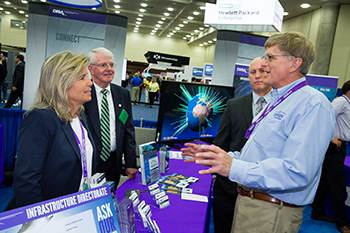About Defensive Cyber Operations Symposium
 Cyber operations are a challenging mission for the U.S. Defense Department and government community that builds, operates and defends networks. Cyber leaders and warriors must continually evolve to adapt to future innovations and develop and leverage cutting-edge tools and technologies. Participants will discuss requirements and solutions to ensure that the networks within DoD are adaptive, resilient and effective across a range of uses and against diverse threats. Leveraging innovative technology, advancing cybersecurity and building new relationships are topics experts will examine in depth May 15-17 at the Baltimore Convention Center in Maryland.
Cyber operations are a challenging mission for the U.S. Defense Department and government community that builds, operates and defends networks. Cyber leaders and warriors must continually evolve to adapt to future innovations and develop and leverage cutting-edge tools and technologies. Participants will discuss requirements and solutions to ensure that the networks within DoD are adaptive, resilient and effective across a range of uses and against diverse threats. Leveraging innovative technology, advancing cybersecurity and building new relationships are topics experts will examine in depth May 15-17 at the Baltimore Convention Center in Maryland.
Speakers will include leaders in the Defense Information Systems Agency, Joint Force Headquarters-DoD Information Network and DoD Chief Information Office. In addition, through a mix of plenary addresses, panel sessions and training tracks, service cyber components, agencies, industry, academia and the military services will add their own insights to the discussions.
Defensive Cyber Operations Symposium Frequently Asked Questions
Registration and Program Questions
Know Before You Go
Exhibit & Sponsor Information
Prepare to be Aware
Conferences present opportunities for America's adversaries to target U.S. government employees, academia, defense industry and other personnel to collect our critical information. Be a hard target! Use good OPSEC practices to protect yourself and your organization's mission.
Recommendations:
- Be aware of your surroundings when discussing sensitive unclassified critical information during the conference and after hours, in common/public areas (e.g. social gatherings, networking mixers, etc.).
- Be suspicious of strangers. Even though they sound like they belong at the conference, don't assume they are there for the same purpose as you.
- Use caution when sharing information with someone you don't know. Ask others to confirm a person's identity before sharing critical information about your organization's past, ongoing or future operations/activities/events. Protect your personal information, such as your room number and daily schedule. Don't give out your business cards freely, particularly when outside the United States. Remember, phishing is still the #1 adversary threat vector into your personal and government computers/devices/networks.
- If you use a laptop or other portable electronic device (personal or government-owned), use it cautiously. Disable the Bluetooth and WLAN/Wi-Fi connections when not in use, and if you use this type of connectivity, understand that you may expose personal and work-related critical information to an adversary. Be especially cautious when using unencrypted/unsecure WLAN/Wi-Fi hotspots.
BE SMART! BE SAFE! PRACTICE GOOD OPSEC!